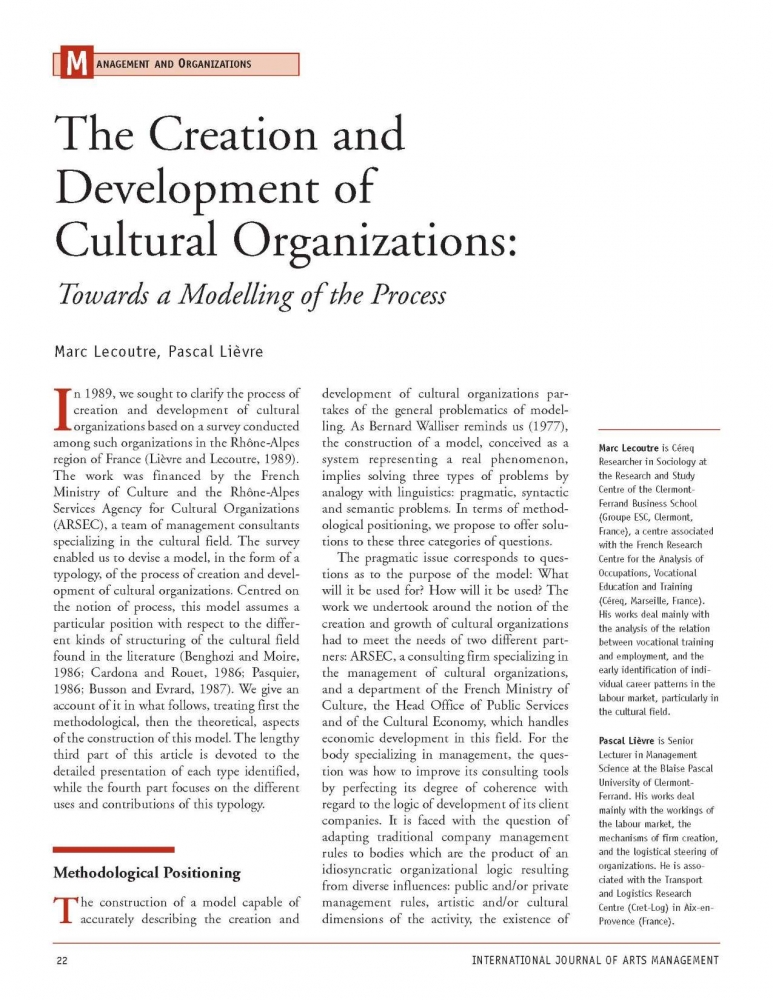The Creation and Development of Cultural Organizations: Towards a Modelling of the Process
Product: Article
$21.00 CA
M. Lecoutre, P. Lièvre
Marc Lecoutre is Céreq Researcher in Sociology at the Research and Study Centre of the Clermont-Ferrand Business School (Groupe ESC, Clermont, France), a centre associated with the French Research Centre for the Analysis of Occupations, Vocational Education and Training (Céreq, Marseille, France). His works deal mainly with the analysis of the relation between vocational training and employment, and the early identification of individual career patterns in the labour market, particularly in the cultural field.
Pascal Lièvre is Senior Lecturer in Management Science at the Blaise Pascal University of Clermont-Ferrand. His works deal mainly with the workings of the labour market, the mechanisms of firm creation, and the logistical steering of organizations. He is associated with the Transport and Logistics Research Centre (Cret-Log) in Aix-en- Provence (France).
ABSTRACT
This article presents a typology of the creation and development processes of cultural organizations in France, the aim of which is to offer experts or governments the opportunity to intervene rapidly in operations. Because we were aware of the great complexity of this field, we chose an approach based on process; that is, in terms of an organization’s birth and history, of the meeting between an individual and an organization, and of the connections between an individual career and the different steps in the historical development of an institution. In this typology, three main factors have been taken into account: the social and professional path of company managers, the conditions of emergence of cultural structures, and the way they usually develop. This enables us to make a distinction between private organizations, with or without cultural objectives, associations whose aim is to provide the creator with a main source of income, associations based solely on volunteers, or a hundred-year-old public structure hindered by its apathy, etc. So as to give this typology more consistency, we have presented it through emblematic examples, built up from empirical facts, though never real ones, which function as representatives of the trajectories of cultural organizations.
KEYWORDS
Firm creation, cultural organization, modelling, empirical typology
RÉSUMÉ
L’article présente une typologie des processus de création et de développement des entreprises culturelles en France ayant pour finalité de permettre à l’expert ou au politique d’envisager des interventions rapidement opératoires. Compte tenu de la complexité de ce secteur, une approche selon le processus a été retenue : naissance et histoire de l’entreprise, rencontre entre un individu et une entreprise et articulations entre une trajectoire individuelle et les étapes de développement d’un établissement. Cette typologie a été réalisée en fonction de trois facteurs principaux, soit le parcours socioprofessionnel des entrepreneurs, les conditions d’émergence (génèse) des structures culturelles et leur mode de développement, facteurs permettant de distinguer les entreprises privées avec ou sans projet culturel des associations visant à assurer le revenu principal de leur créateur ou fonctionnant sur le strict mode du bénévolat, ou encore d’une structure publique centenaire prisonnière de son inertie, etc. Afin de donner corps à cette typologie, les auteurs la présentent sous la forme de modèles à caractère exemplaire, construits à partir de faits empiriques mais non réels, figures « emblématiques » de trajectoires d’entreprises culturelles.
MOTS CLÉS
Création d’entreprise, entreprise culturelle, modélisation, typologie empirique
RESUMEN
En este artículo se presenta una tipología de los procesos de creación y desarrollo de las empresas culturales en Francia, cuya finalidad es la de permitir al experto o al político emprender operaciones que resulten rápidamente operativas. Considerando la complejidad de este sector, se optó por un enfoque en términos de proceso, es decir en términos de nacimiento y de historia, de encuentro entre un individuo y una empresa, de articulaciones entre trayectoria individual y etapas de desarrollo de un establecimiento. Se realizó esta tipología de acuerdo con tres factores principales, el recorrido socio-profesional de los empresarios, las condiciones de surgimiento (génesis) de las estructuras culturales y su modo de desarrollo, lo que permite distinguir entre empresas privadas con o sin proyecto cultural, asociaciones que buscan obtener una fuente de ingresos para su creador, o que funcionan estrictamente con trabajo voluntario, estructura pública centenaria prisionera de su inercia, etc. Para volver concreta esta tipología se la presenta bajo la forma de modelos de carácter ejemplar, construidos a partir de hechos empíricos pero no reales, figuras “emblemáticas” de trayectorias de empresas culturales.
PALABRAS CLAVE
Creación de empresa, empresa cultural, modelización, tipología empírica
